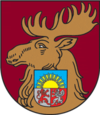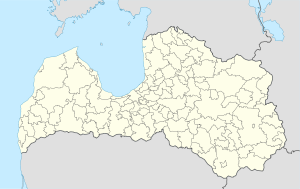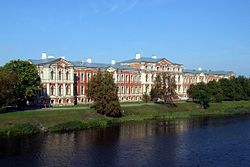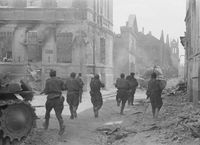- Jelgava
-
Jelgava — City — Jelgava Aerial View 
Flag
Coat of armsLocation in Latvia Coordinates: 56°39′N 23°43′E / 56.65°N 23.717°ECoordinates: 56°39′N 23°43′E / 56.65°N 23.717°E Country  Latvia
LatviaTown rights 1573 Government – Mayor Andris Rāviņš[1] Area – Total 60 km2 (23.2 sq mi) – Water 2.34 km2 (0.9 sq mi) Population – Total 64,516 (2,011) – Density 1,073/km2 (2,779.1/sq mi) Time zone EET (UTC+2) – Summer (DST) EEST (UTC+3) Postal code LV-300(1-9); LV-3024; LV-3035 Calling code +371 630 Number of city council members 15 Jelgava (pronounced [jælɡava] (
 listen)) (German: Mitau) is a city in central Latvia about 41 km southwest of Riga with about 64 thousand inhabitants. It is the largest town in the region of Zemgale. Jelgava is known as the former capital of the Duchy of Courland, and was the capital of the Courland Governorate until 1919.
listen)) (German: Mitau) is a city in central Latvia about 41 km southwest of Riga with about 64 thousand inhabitants. It is the largest town in the region of Zemgale. Jelgava is known as the former capital of the Duchy of Courland, and was the capital of the Courland Governorate until 1919.Jelgava is situated on a fertile plain rising only 3.5 metres (11.48 ft) above sea level on the right bank of the river Lielupe. At high water the plain and sometimes the town as well can be inundated. It is a railway center and is also host to Jelgava air base. Its importance as a railway centre can be proven by the fact that it lies at the junction of over 6 railway lines connecting Riga to Lithuania, eastern and western Latvia, and Lithuania to the Baltic sea.
Contents
Etymology
The name Jelgava is believed to be derived from the Livonian word jālgab, meaning "town on the river."[2] The origin of the German name Mitau is unclear, although it is suggested that it came from the Latvian words mīt or mainīt, meaning "to exchange" or "to trade," thus making it "the place where trading takes place." An alternate explanation is that Mitau came from Mitte in der Aue, German for "the middle of the Aa", referring to the Lielupe River, formerly known as the Courland Aa (Kurländische Aa in German).[citation needed]
Sights
Jelgava has regular, broad streets lined with the mansions of the Baltic German nobility who resided at the capital of Courland. The old castle (1266) of the dukes of Courland, situated on an island in the river, was destroyed by Duke Biren, who had a spacious palace erected (1738–1772) by Bartolomeo Rastrelli at the bridge across the Lielupe. The palace contains the sarcophagi of almost all of the Curonian dukes, except the last one. The future Louis XVIII sojourned in the palace between 1798 and 1800. It now functions as the LLU, Latvijas Lauksaimniecības Universitāte, or Latvian University of Agriculture. Other landmarks include the Baroque church of St. Anne, the tower of the destroyed Trinity church, and two handsome structures: the Villa Medem and the Academia Petrina.
History
The Livonian settlement Jelgava began developing between the rivers Lielupe and Driksa during the 10th century. Led by the Grand Master Konrad von Mander, the crusading Livonian Order constructed the castle in Mitau on a natural island fortification (Pilssala) in 1265-1266. Using Mitau as a southern fortress, the German knights subdued the surrounding Livonians and Semigallians by 1290. The town rose in importance as a defensive fixture against the Lithuanians to the south, who succeeded in plundering Jelgava in 1345.
As a result of the fall of the Livonian Order in the Livonian War, Mitau became a town of the Duchy of Courland in 1561. Jelgava received city rights in 1573, and became the capital of the united duchies of Courland and Semigallia in 1578. When the Duchy of Courland split in 1596, Jelgava became the residence of Duke Friedrich Kettler of Semigallia. The city again became the capital of the united duchies in 1617. Because the duchy became a vassal of the Polish-Lithuanian Commonwealth, Jelgava was also referred to by the Polish name Mitawa. The Commonwealth's repeated wars with Sweden subjected Jelgava to several sieges. Despite the wars, the city grew as a center for trade and industry. As Courland's neighbors increased in strength, however, the duchy and Jelgava began to fall under Russia's sphere of influence; Carl Christian Joseph of Saxony, Duke of Courland had to abdicate under Russian siege in 1763. The duchess from 1711-1730 was Anna Ivanovna, later Empress Anna I of Russia.
The penultimate duke of Courland, Ernst Johann von Biron, expanded the cultural aspects of Jelgava. He constructed the ducal palace and opened the first public library in the city. In 1775 the last Duke of Courland, Peter von Biron, founded the Academia Petrina, which became a cultural center for the country. The duke also encouraged theatrical performances at his court.
With the outbreak of the French Revolution in 1789, the citizens of Jelgava clamored for more rights. However, Imperial Russia annexed the city with Courland in 1795 during the Partitions of Poland. As the seat of the Count of Provence, the palace of Jelgava was the residence (1798–1801 and 1804–1807) of Louis XVIII before he became the French king. Although the city was occupied by Prussian troops during the Napoleonic Wars, it was largely spared destruction.
Jelgava further expanded after the construction of its railway in 1868. The development of its infrastructure encouraged rural Latvians to migrate to the city, as merchants, craftsmen, teachers, and officials. By 1914 Jelgava had over 45,000 inhabitants. However, Jelgava suffered considerably after the outbreak of World War I. The spirited defence of Jeglava by two battalions of the Latvian Home Guard in 1915, helped inspire the formation of the Latvian Rifles. German troops occupied the city during the war, and after the war in 1919 Jelgava became a battleground between Bolshevik Red Guards, German paramilitaries, and Latvian freedom fighters. After the latter's victory, Jelgava became an important city in independent Latvia.
As a result of the Nazi-Soviet Pact, Jelgava was occupied and annexed with the rest of Latvia by the Soviet Union during World War II in 1940. Much of the city's remaining German population travelled westward during the Nazi-Soviet population transfers. German forces from Army Group North occupied Jelgava from 1941-1944 until the capture of the city by the Red Army. The city's historical center, industry, rail network, and public buildings were heavily damaged by the fighting, with almost 90% of the city destroyed.
Jelgava was rebuilt after World War II as part of the Latvian SSR, and following Latvian independence, Jelgava is now a popular tourist site.
Demographics
As of 1 January 2011, the city had a population of 64516.
Sports
The city's main football team, FK Jelgava, plays in the Latvian Higher League and won the 2009/2010 Latvian Football Cup.
Notable people
- August Johann Gottfried Bielenstein (1826–1907) - linguist, folklorist, ethnographer
- Joseph Hirshhorn (1899–1981), entrepreneur, financier and art collector
- Renārs Kaupers (1974-), Latvian singer
- Natalia Laschenova (1973-) Olympic team gold medalist (gymnastics)
- Jānis Lūsis (1939-), Latvian (and Soviet) athlete - javelin thrower
- Kazimierz Pułaski (1745–1779), Polish military officer, a commander in the Bar Confederation, a General in the Continental Army during the American Revolutionary War
- Elza Radziņa (1917–2005), Latvian actress
- Einars Repše (1961-), Latvian politician
- Paul Schiemann (1876–1944), journalist, editor and politician
- Artūrs Skrastiņš (1974-), stage and film actor
- Mamert Stankiewicz (1889–1939), the captain of the Polish merchant marine
- Eduard Totleben (1818–1884), Russian military engineer
- Carl Christian Joseph of Saxony, Duke of Courland and Semigallia (1759–1763)
- Feodor Stepanovich Rojankovsky (1891–1970), illustrator
- Kaspars Znotiņš (1975-), stage and film actor
International relations
Twin towns — Sister cities
See also: List of twin towns and sister cities in LatviaJelgava is twinned with:
 Pärnu, Estonia, since 1957
Pärnu, Estonia, since 1957 Šiauliai, Lithuania, since 1960
Šiauliai, Lithuania, since 1960 Vejle, Denmark, since 1992
Vejle, Denmark, since 1992 Shinjinga, Taiwan, since 2000
Shinjinga, Taiwan, since 2000 Alcamo, Italy, since 2002
Alcamo, Italy, since 2002 Baranovichi, Belarus, since 2003
Baranovichi, Belarus, since 2003 Berlin, Germany, since 2003
Berlin, Germany, since 2003 Hällefors, Sweden, since 2004
Hällefors, Sweden, since 2004 Moscow Southern Administrative Zone, Russia, since 2003
Moscow Southern Administrative Zone, Russia, since 2003 Ivano-Frankivsk, Ukraine[3]
Ivano-Frankivsk, Ukraine[3] Nacka, Sweden, since 2004
Nacka, Sweden, since 2004 Rueil-Malmaison, France, since 2006
Rueil-Malmaison, France, since 2006 Magadan, Russia
Magadan, Russia Białystok, Poland
Białystok, Poland Nova Odessa, Brazil
Nova Odessa, Brazil
External links
- Map of Jelgava
- City paper
- e-Jelgava.lv - community portal in Latvian - news, articles, forum and chat
References
- ^ a b Jelgava City municipality web page
- ^ Latvia as an independent state, Dr Alfred Bilmanis, p124 accessed 26 March 2009
- ^ "Офіційний сайт міста Івано-Франківська" (in Ukrainian). mvk.if.ua. http://www.mvk.if.ua/news/4114/. Retrieved 7 March 2010.
Republican cities and Municipalities of Latvia Republican cities: Municipalities: Aglona • Aizkraukle • Aizpute • Aknīste • Aloja • Alsunga • Alūksne • Amata • Ape • Auce • Ādaži • Babīte • Baldone • Baltinava • Balvi • Bauska • Beverīna • Brocēni • Burtnieki • Carnikava • Cēsis • Cesvaine • Cibla • Dagda • Daugavpils • Dobele • Dundaga • Durbe • Engure • Ērgļi • Garkalne • Grobiņa • Gulbene • Iecava • Ikšķile • Inčukalns • Ilūkste • Jaunjelgava • Jaunpiebalga • Jaunpils • Jēkabpils • Jelgava • Kandava • Kārsava • Kocēni • Koknese • Krāslava • Krimulda • Krustpils • Kuldīga • Ķegums • Ķekava • Lielvārde • Līgatne • Limbaži • Līvāni • Lubāna • Ludza • Madona • Mālpils • Mārupe • Mazsalaca • Mērsrags • Naukšēni • Nereta • Nīca • Ogre • Olaine • Ozolnieki • Pārgauja • Pāvilosta • Pļaviņas • Preiļi • Priekule • Priekuļi • Rauna • Rēzekne • Riebiņi • Roja • Ropaži • Rucava • Rugāji • Rundāle • Rūjiena • Salacgrīva • Sala • Salaspils • Saldus • Saulkrasti • Sēja • Sigulda • Skrīveri • Skrunda • Smiltene • Stopiņi • Strenči • Talsi • Tērvete • Tukums • Vaiņode • Valka • Varakļāni • Vārkava • Vecpiebalga • Vecumnieki • Ventspils • Viesīte • Viļaka • Viļāni • Zilupe This article incorporates text from a publication now in the public domain: Chisholm, Hugh, ed (1911). Encyclopædia Britannica (11th ed.). Cambridge University Press.Categories:
This article incorporates text from a publication now in the public domain: Chisholm, Hugh, ed (1911). Encyclopædia Britannica (11th ed.). Cambridge University Press.Categories:- Jelgava
- Cities in Latvia
- Republican cities of Latvia
Wikimedia Foundation. 2010.






